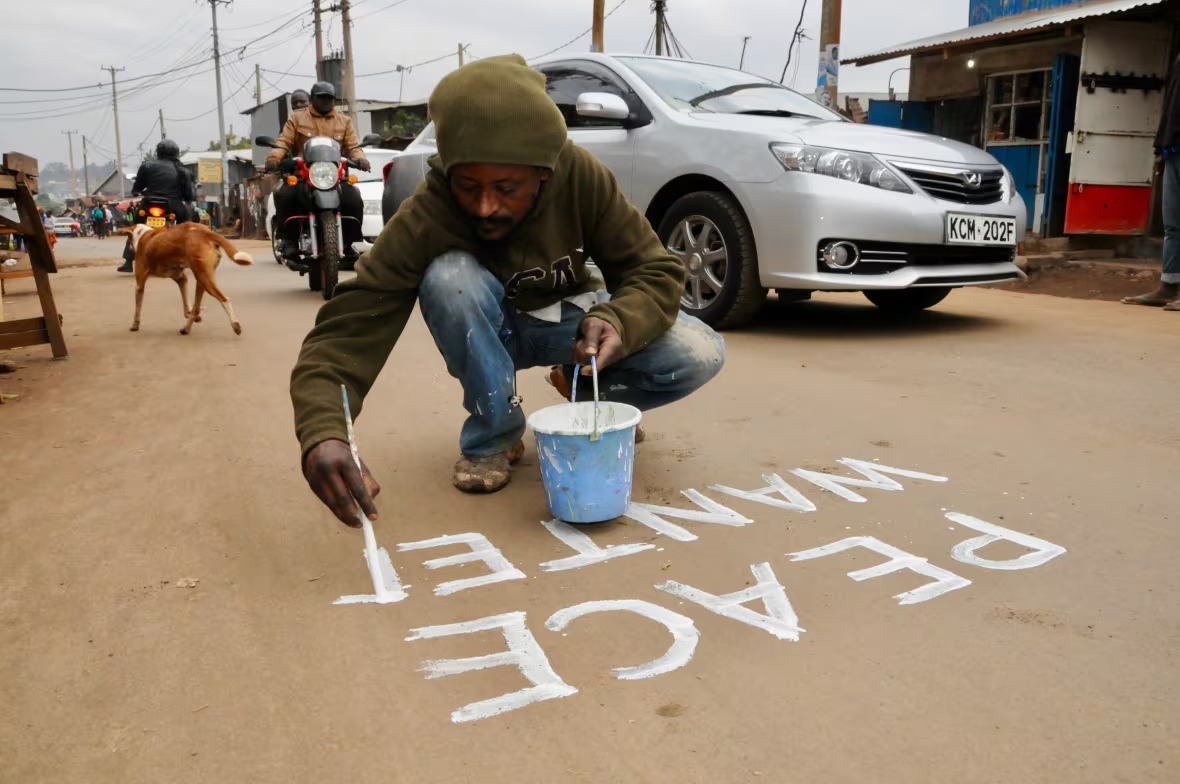'We just hope it will be peaceful': Kenyans brace themselves for general election
Country votes on Aug. 8
Kenyans are preparing for the worst but hoping for the best as they prepare for the country's general election on Aug. 8.
Given the recent history of post-election violence, that means sending children out of high-risk areas, reducing the volume of items in stores to deter looters and gathering supplies in case people can't leave their homes.
"We are afraid there could be violence," said Violet Sacco, standing at the roadside along Waiyaki Way in Nairobi's northwest, waiting to board a bus with her two daughters, Alice, 6, and Grace, 10. She was sending them to the country's western region, where she hoped they would be safe.
"With the children, you can be so worried. But when you are alone, you can run far."
Sacco said there is widespread concern there could be post-election violence of the kind that occurred in 2007 after accusations the vote was rigged.
"The way people are talking, the elders, we are afraid of that," she said.
This election is particularly tense. Opposition leader Raila Odinga has previously contested election results, while current President Uhuru Kenyatta has said he has no plans to be Kenya's first single-term president.
Previous elections have ignited violence between some of Kenya's largest ethnic groups, who often vote by tribe. There are about 40 ethnic groups in the country. Current president Kenyatta is part of the Kikuyu tribe, the largest, while opposition leader Odinga is Luo, a group that has often felt excluded.
'Kenya is still the same'
Last week, a senior electoral commission official in charge of the electronic transmission of votes was found dead, his body showing signs of torture. It has added to concerns about the integrity of the vote – particularly after an audit found tens of thousands of irregular names on the voting lists.
Geoffrey Otiende was in Eldoret, a town in Kenya's west, when violence erupted after the vote in 2007. He said he watched people – and in some cases police officers – storm onto properties, either stealing or destroying things, and targeting specific tribes.
They set maize crops on fire, and killed cattle.
At the time, Otiende owned a club with three pool tables, each worth about $750 Cdn. They were all set ablaze. Fearing for his life, he fled to Nairobi.
"Kenya is still the same. You look at that time and this time, there is no difference. Nothing has changed," he said. "If anything happens, people will still suffer."
The violence in 2007 killed more than a thousand people. The government says many efforts are being taken to ensure it doesn't happen again – but not everyone has faith.
In Kibera, the largest slum in Nairobi, where police clashed with rioters in 2007, John Mungai was emptying his kitchen supplies shop, sending stock to his home and safe locations that were less likely to be looted if violence erupts again.
As he chatted, clients came by asking why the stall was so empty and whether he was scared.

"It's very dangerous," he said, adding he's just trying to prepare as he did a decade ago.
Others were putting up gates to control access to communities or temporarily moving out of the area until after the elections have passed.
On Aug. 3, police met with a group of youth – many of whom are known for stirring up trouble in the community. During the meeting, an officer said there are no tribes in Kenya, just the rich and the poor. He said the police were there to work with the Kibera community – and to protect them.
Street artist Solomon Muyundo, dubbed Solo 7, attended the meeting and has been painting messages of peace around the community: "Peace Wanted Alive" and "Peace Mtaani," meaning peace all around.
Muyundo was in Kibera in 2007 when violence erupted – now he's fighting back.
"Those who were protesting and those who had weapons, they are now the ones who say to me, 'Solo, come and paint here,'" he said.

Hoping for peace
In the days before this year's vote, nearly every bus station in Nairobi was crowded, as people clamoured to get out of the city. Fred Assava, a ticketing agent at Kangemi bus stop, said the rush was busier than the Christmas holidays, even with ticket prices more than double the usual fare.
While some, like Sarah Mayeye, were sending their children out of the city to stay with relatives, others were travelling to vote in their home constituencies.
Paul Murunga decided to cast his ballot in Kiambu County, a region dominated by a different tribe than his, because he felt his vote would matter more in the community where he lives and works, not his home in the western region.
"I trust there will be peace," he said, but added he's not afraid of being targeted for violence.
It's a change others have noticed in Kibera as well – in 2007, it was rare to find those supporting the president's Jubilee party, primarily Kikuyu, showing it publicly in the Luo-dominated community.

This time, members of a peace committee said people are feeling freer to share their diverse political opinions.
Still, police are sending extra officers to polling stations and throughout the communities.
"We don't anticipate for the worst," said Felix Nduti France, operations officer with the Administration Police Kibra.
"For the first time, this election cycle, we are seeing a relatively calm situation. For me I see there is a lot of degree on tolerance," said Philip Omondi Otore, secretary of the sub-county peace committee of Kibra.
They've been running peace marches, meetings and events to promote dialogue between different tribes.
"At the end of the day, there is need for life and peaceful coexistence," he said. "We just hope it will be peaceful."
With files from Thomas Bwire


